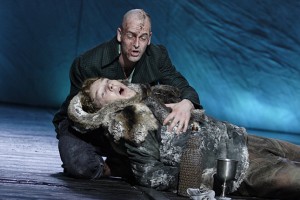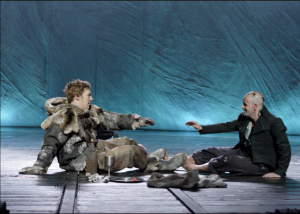When people find out I already saw Danny Boyle’s “Frankenstein” five times, not to mention that this is only a broadcasted movie version of the original live recording, they raise their eyebrows and ask me, ‘Is it that good?!’. My answer to them is: Yes, it is that good. Then again, there are probably better stories, better actors, better stage plays, better directions. I’m not saying this is the Most Successful Play in the Universe. But it speaks to me. And I will watch it again, twice, later on this summer.
It spoke to me already when I was reading C. G. Jung’s “Answer to Job”, a highly controversial treaty on God’s complex character in the light of how He treats Job. Some thoughts stayed with me and reverberated off the emotional network of “Frankenstein”. I am not ashamed to say I shed tears when I first saw the play. Not because of the brilliant acting of both Benedict Cumberbatch and Jonny Lee Miller, which is undoubtedly one of the highlights of the production, but because there are several moments in the play that resonated with me. When the Creature thinks Frankenstein is dead, he cries, he feels lost, he says, ‘don’t leave me alone… can I die? what will it be like?… if you go, I will go, too’. I have been there. Oh, that harrowing, terrible, empty feeling… when there is nothing to wake up for. Nothing to continue for. The tears shed for the Creature were tears shed for myself, too. ‘The only thing I wanted was your love… I would have loved you so much’, he says, and kisses the temple of the unconscious Frankenstein. No human heart can stay unmoved… ‘My poor Creator’, he adds, heart-broken. He knows what Victor and the audience knew a while back: the Creature has surpassed the Creator. This is the fate of parents and children, this is how the world evolves. But the Creature has surpassed his Creator in a very important way: he has learnt how to love, he, the one put together from dead tissue, he, the one without a name, he, the one who never got to hold a woman in his arms – while Victor, the scientific genius, remained unable to love, because all his life he considered science and progress to be more important than being close to people.
Upon seeing it for the fourth time a few days ago, the familiarity of yet another angle of this moment struck me. When Victor comes to, the Creature is overjoyed. ‘You do love me, Master!’, he cries. Victor replies, ‘I don’t know what love is’. ‘I’ll teach you, Master’, the Creature offers. ‘Every chance I’ve had at love, I threw away… Only you give me purpose… you, I desire’, Victor says resignedly. Oh, the horror. This time, I saw myself in Victor. Sometimes I feel that I don’t know what love is. I am incapable of truly loving someone. Anyone. My creation (my writing), that is what gives me purpose. That, I desire. It’s such emptiness sometimes! To be faced with this realization… But we can only be purged of our sins if it really hurts. Of course, this is not the first reminder. I should have known, when I started writing about Meriel, my wretched paintress, and her inability to love her son as opposed to her own art. But somehow, even though I knew I was partly writing about myself, I could not accept the similarities. Through Victor’s fate it became clear.
Thus I reflected a little bit on how two beloved actors can bring one very close to the core of the story, and how they can unveil dark, hidden nooks in our souls. Through our admiration and love for them, our empathy grows, perhaps out of proportion, and we get to places we have never been before. Our vision is cleared. Jonny Lee Miller is a highly likable Creature, one that sometimes reminds us of a drooling toddler, other times, of an obstinate youngster; he craves to be loved and accepted, first and foremost by Frankenstein, the brilliant scientist, whom Benedict Cumberbatch plays perfectly. Victor despises mediocrity and he wishes to rise out of it; we see through him, just like Elisabeth sees through him, as it is pride and vanity that led Frankenstein on, beyond the point of no return. In order to become God through learning how to create, how to create life beside the natural way, procreating. But The Creature turns out to be much like a child in many respects: he has a mind of his own, and later it becomes apparent that he also possesses a heart of his own, one more capable of loving than Frankenstein’s. Despite the vengeful nature that he adopts (educated by humans around him through intolerance, hatred, bias, hypocrisy), the Creature is a lot more human than Frankenstein. He feels a lot more and a lot more strongly. ‘This is your universe, Frankenstein!’, the Creature thunders, when Victor is faced with the consequences of his actions. ‘I will not help a murderer’, protests Victor, upon the pleas of the Creature to build him a female counterpart. ‘You made me one’, retorts the Creature. ‘You killed that boy, not me!’ Victor throws in the last of his aces into the rhetoric. The blame is thrown to and fro, and it ends… where exactly? They are both to blame. Both are responsible for their actions. The Creator should not have abandoned his Creature, and the Creature should not have allowed his character to be molded by hateful circumstances. So the question is: was there an original sin, the aftermath of which only God can help us redeem, or were we made to become whatever circumstances shaped us into? Is there a free will, or is our fate shaped beforehand? These questions, of course, are only valid if we believe. I am not sure I believe right now. But even if I do, I am sure that God is not perfect. He may pose as such but His actions leave a lot to be desired. It may even seem that His children have surpassed Him in certain ways. According to Jung, He Himself saw this as undeniable truth and that is why He decided to materialize in the shape of a human: Jesus.
“Frankenstein” does not state. It raises questions, it shows different points of view, it allows the audience to witness very intimate details of two miserable creatures, both looking for something. In each other, they find redemption, a possible way of life, and ultimately, LOVE, however twisted it may seem. In a way, Victor and his Creature are lucky, because they represent each other’s purpose and motivation. Even beyond widely accepted rules and social conventions, they find peace in the ruckus of their struggle against each other. And for that, despite their individual shortcomings and weaknesses, they are both to be envied.
(photo 1 by Catherine Ashmore)



